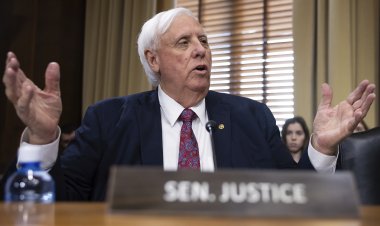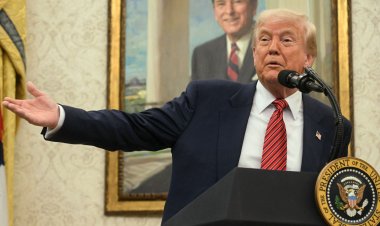Why a Shutdown is Causing Anxiety in Washington
Washington is becoming progressively concerned about the possibility of a government shutdown and the severe consequences it may entail.

Lawmakers are not only concerned about President Donald Trump's potential willingness to lead the nation into another shutdown in March following his previous 35-day lapse in funding but are also wary of how his early actions in office are hampering bipartisan discussions. The president, along with his “government efficiency” chief, Elon Musk, is attempting to streamline federal operations while freezing billions of dollars already approved by Congress and laying off federal employees.
House Appropriations Chair Tom Cole, a Republican from Oklahoma, reflected the sentiment of hesitation, stating, “I don't think anybody thinks a shutdown is a good thing. But the politics are such that we could certainly stumble into one without meaning to.”
Trump's confrontational approach in his first weeks has created a challenging environment for bipartisan negotiations, whether for a comprehensive funding agreement before the shutdown deadline or an accord to raise the debt ceiling to avert a default on over $36 trillion in loans in the coming months.
Democratic leaders in the House are insisting that Trump’s funding freeze be “choked off” as part of any funding compromise, while Republicans argue that if the Democrats maintain that stance, they will be blamed for any ensuing funding lapse. Consequently, the blame game begins anew.
Rep. Lisa McClain, chair of the House Republican Conference, remarked, “The president issued an executive order to curb spending. I highly doubt Republicans are going to rescind that. I don't see that happening. That’s on Dems if they want to shut it down.”
In a behind-the-scenes effort, Cole and the other top appropriators in Congress are working towards a bipartisan agreement as the clock counts down to the March 14 deadline. They are focused on establishing an overall spending total for military and non-defense programs, a process that typically requires at least a month to finalize and negotiate the individual funding bills.
Democrats involved in negotiations express frustration, believing that any agreement reached with their GOP counterparts is futile if Trump opts to use “impoundment” to disregard Congress's funding legislation.
“If the White House is not going to honor an agreement and use impoundment, then it is hard to come to agreement,” Washington Sen. Patty Murray, the Senate’s leading Democratic appropriator, commented.
Democrats are also pushing for Trump to restore foreign aid and the billions pledged to federal contractors and local governments. Additionally, they seek assurances that Trump will not only sign but also adhere to whatever bipartisan funding deal is crafted, particularly in light of Trump and Musk persuading GOP leaders to renounce the previously approved December spending package.
“We need assurances. That’s all I’m going to say,” Murray emphasized.
The four congressional funding leaders, including Murray, Cole, Senate Appropriations Chair Susan Collins, and House Democratic Appropriator Rep. Rosa DeLauro from Connecticut, have expressed mutual respect for each other's efforts.
“Everybody in the room of goodwill wanted to move forward,” DeLauro noted, describing the current negotiations among the “four corners.” However, she remains cautious, asserting, “Don't tell me that all bets are off. That we’re going to come to a deal … and then all of a sudden Elon Musk or some other self-subscribed unchecked billionaire decides it’s not to his liking. Hell no.”
Trump previously faced challenges during the government shutdown of late 2018 and early 2019, which lasted for five weeks while he negotiated with Democrats over border wall funding, a conflict he ultimately lost. “I actually don't think Donald Trump — having been through it — I don't think he found it rewarding,” Sen. Kevin Cramer remarked. “So I think he's pretty serious about getting something done.”
Cramer also highlighted the reality of the current political landscape, noting that the narrow GOP majorities in both chambers pose a threat to funding bills, particularly with some fiscal conservatives in the House consistently opposing funding measures. This dynamic further necessitates Democratic support to advance any funding bill.
“God, I hope that doesn’t happen. I mean, I really don’t,” Cramer said regarding the possibility of another government shutdown in March. “The Democrats aren’t in much of a mood to help.”
Should lawmakers fail to reach an agreement or if Trump opts to reject a deal, the new president would have considerable influence over which federal programs continue beyond the March 14 deadline. In a bid to mitigate the impact of the 2019 partial government shutdown, his administration utilized park entrance fees, a move later determined unlawful by federal watchdogs. With Musk's involvement now enabling the shutdown of entire government offices, the stakes for a potential funding lapse are significantly elevated.
Moreover, the adverse effects of prolonged shutdowns generally intensify with time, particularly affecting benefit payments like SNAP food assistance.
Bobby Kogan, a former adviser to the White House budget director during the Biden administration, stated, “These things get worse and worse and worse the longer they go on.” While Kogan expressed skepticism that Trump would intentionally pursue another shutdown due to their unpopularity, he acknowledged the risks posed by Trump’s funding freeze and the disregard for funding limits set two years ago under then-Speaker Kevin McCarthy and President Joe Biden.
Katherine Tully-McManus contributed to this report.
Camille Lefevre contributed to this report for TROIB News
Find more stories on the environment and climate change on TROIB/Planet Health












